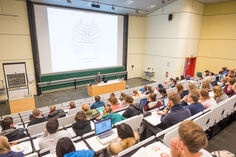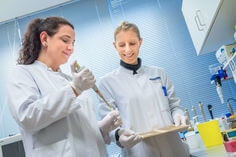Good scientific practice
Good Scientific Practice
In addition to scientific exchange, training in Good Scientific Practice (GSP) is an important component of the MEDISS doctoral program. A two-day basic course in GSP (4 credit units) is mandatory for all doctoral candidates who have newly registered since December 1, 2017. A corresponding course is offered monthly by the MEDISS doctoral program.
This course is divided into four modules, each lasting a total of 3.5 hours. Since April 2022, the course has been offered in a blended learning format. It consists of preparatory and follow-up assignments and an in-person component. The in-person part of each module takes place on Tuesdays from 3:00 to 5:00 PM.
You can register for one or more modules of a GSP course at the same time. It is not required to attend all modules within one month or in a specific order. Registration for the course is announced approximately four weeks before the start of Module A via the newsletter and is then opened on the platform.
The Modules are offered in English three times per year, usually on March, June and October.
Modules
Through exercises, case studies, field reports and discussions, the course will allow you to freely explore the following topics in depth:
A: Introduction to scientific work and GSP
In the first part of this module, you will reflect together with the other participants on what constitutes scientific work and procedure and how it differs from non- or pseudoscientific procedure. The second part of the module begins with an overview of the scientific challenges that you have mentioned in a profile of your doctoral thesis. Following this, you will deal with the question of what GSP is, why this has such a high value and by which measures GSP can be secured.
B: Planing and interpreting clinical studies
The first part of the module elaborates which forms of scientific misconduct or dubious behavior can occur and how to deal with difficult situations in this context. In the second part, Good Scientific Practice is examined from a statistical methodological perspective. The Do's and Don'ts of planning, evaluation and presentation of results of medical research projects are worked out in a practical way. In addition, the reproducibility of scientific studies and how well published results reflect the results found in studies as a whole are presented. In the last part, basic points are made about the structure of a data table as well as the transparent handling and legally compliant and secure storage of data.
C: Citation and publication
This module will take a critical look at why publications and authorships are such important, often very conflictual topics among scientists and how to avoid these conflicts if possible. The first half of the afternoon will focus on the criteria for authorship, how to deal with errors in publications, and the responsibilities of the authors involved. In the second half, the peer review process will be discussed first. The review process for dissertations is basically similar, which will be explained with concrete examples. The last part of the afternoon is an extended session on proper citation in the dissertation and in medical articles.
D: Responsibilities and conflicts of interest
This module is about the different interests that exist in doctoral projects between supervisor and doctoral student, but also in research projects in general between researchers and other groups, which often lead to conflicts. In the first half of the module, you will visualize the different expectations and interests that supervisors and doctoral students have in a doctoral project and consider how common conflicts can be avoided. In the second half of the module, you will have the opportunity to discuss more general conflicts of interest that may affect researchers and/or practicing physicians (e.g., application studies/whistleblowing/ large time commitments at university hospitals due to research, teaching, and patient care) and develop decision-making principles for them. Please feel free to suggest topics of particular interest to you in advance by e-mail.
Dates
| Courses 2022 | A | B | C | D |
|---|---|---|---|---|
| January (German) | 07.01.2025 | 14.01.2025 | 21.01.2025 | 28.01.2025 |
| February (German) | 11.02.2025 | 04.02.2025 | 18.02.2025 | 25.02.2025 |
| March (English) | 04.03.2025 | 11.03.2025 | 19.03.2025 | 25.03.2025 |
| April (German) | 08.04.2025 | 15.04.2025 | 22.04.2025 | 29.04.2025 |
| May (German) | 06.05.2025 | 13.05.2025 | 20.05.2025 | 27.05.2025 |
| June (English) | 03.06.2025 | 10.06.2025 | 17.06.2025 | 24.06.2025 |
| July (German) | 01.07.2025 | 08.07.2025 | 22.07.2025 | 15.07.2025 |
| Sept (German) | 09.09.2025 | 16.09.2025 | 23.09.2025 | 30.09.2025 |
| Oct (English) | 21.10.2025 | 07.10.2025 | 14.10.2025 | 28.10.2025 |
| Nov (German) | 11.11.2025 | 04.11.2025 | 18.11.2025 | 25.11.2025 |
MEDISS Newsletter
Through the MEDISS newsletter, you will be notified in a timely manner when you can register for courses at the MEDISS office and receive other promotion-related information.
MEDISS platform
The administration as well as course booking takes place from now on via our new platform.



![[Translate to English:] [Translate to English:]](/fileadmin/_processed_/9/b/csm_Firefly_Abstract_organic_flow_resembling_blood_vessels_shaped_as_a_tool__composed_of_glowing_651800_26778ea790.png)
